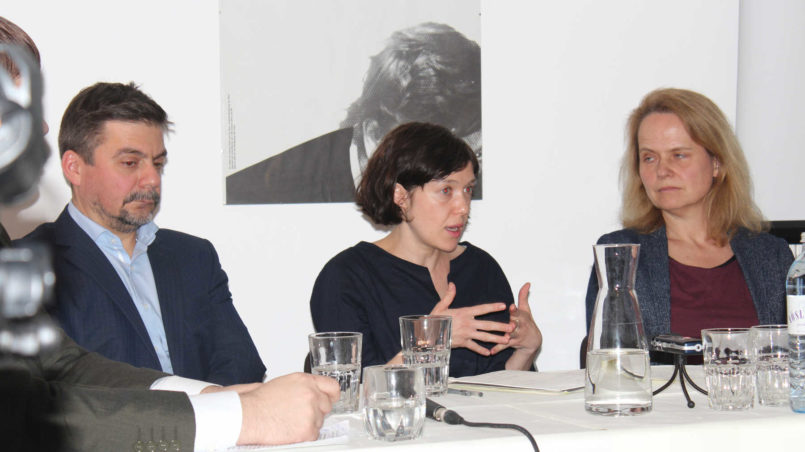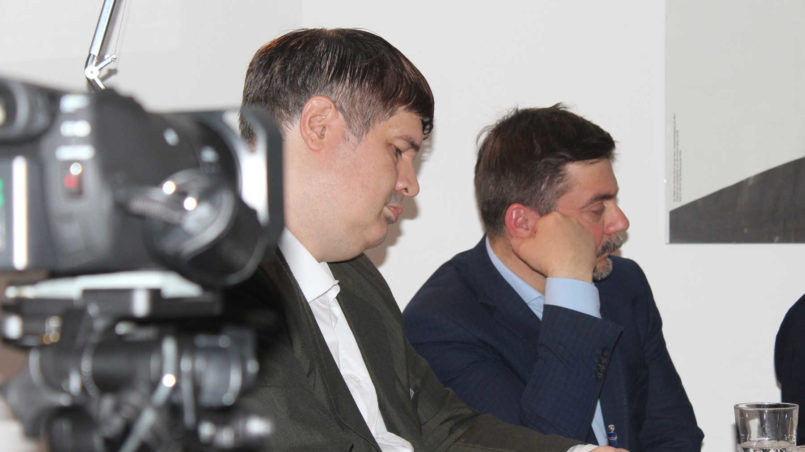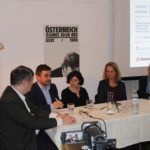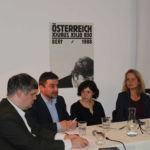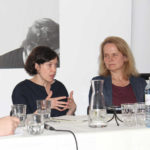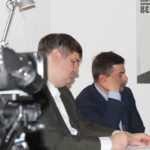Ukraine – Dialogue instead of Monologue
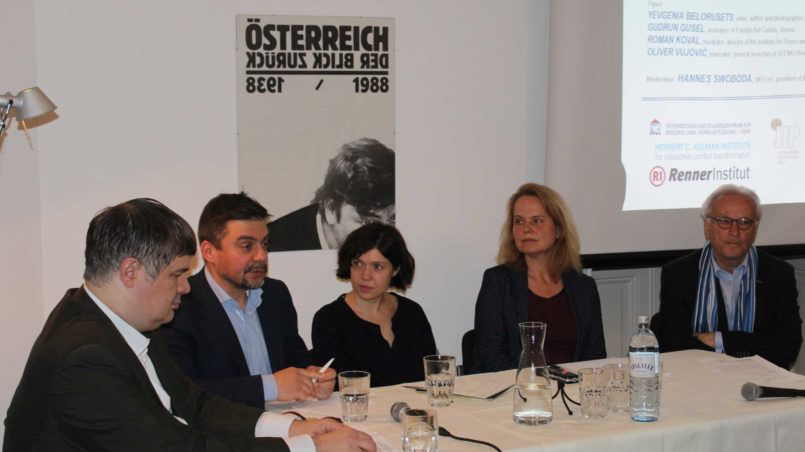
Event data
- Datum
- 29. 3. 2017
- Host
- Republikanischer Club in Kooperation mit dem Österreichischen Studienzentrum für Frieden und Konfliktlösung, Platform for Dialogue and Conflict resolution in the ukraine, Herbert C. Kelman Institute, Renner Institut, International Institute for Peace, Die Grüne Bildungswerkstatt, tranzit und der Gesellschaft für Eurasische Studien.
- Location
- Republikanischer Club, Rockhgasse 1, 1010 Wien
- Event-type
- Podiumsdiskussion
- Participants
- Hannes Swoboda, Moderator, Präsident des International Institute for Peace
- Yevgenia Belorusets, Künstlerin, Autorin und Fotografin, Kiew
- Gudrun Gusel, Bereichsleiterin der Auslandshilfe, Caritas Wien
- Roman Koval, Mediator, Direktor des Institute for Peace and Common Ground, Kiew
- Oliver Vujović, Journalist, Generalsekretär von SEEMO ("South East Europe Media Organisation"), Wien
On 29th March 2017, a podium discussion took place on the premises of the Republikanischer Club in Vienna’s first district with the title: “Ukraine – Dialogue instead of Monologue”. Yevgenia Belorusets, Gudrun Gusel, Roman Koval and Oliver Vujović were the participants.
The evening was moderated by Hannes Swoboda.
He opened the event by saying that he believes that, in times of crisis, one should talk to each other. In particular, because, in the Ukraine crisis, the victims are civilians and not politicians. In his opinion, Austria should initiate an active, political, cultural and economic dialogue.
He then explained his functions to the plenum.
At first, Gudrun Gusel, department head of foreign aid at Caritas, Vienna, spoke about the humanitarian situation in the Ukraine. Caritas has been active in humanitarian aid since the beginning of the conflict in the Ukraine (since the beginning of 2014). She quoted from a statement which was sent to the United Nations.
The weakest are affected most – the eldery, the disabled, and children. Greater attention from the international community is called for as the only way to end the war, which has already claimed over 10,000 lives. Gusel stated that, in 2017 – according to the OSCE – the use of heavy weapons as well as ceasefire violations have increased. This further worsens the precarious humanitarian situation: 3.8 million people need humanitarian support, in particular those who live near the front lines. These often do not have the physical or financial possibility to flee. These people often no longer have access to education, food, medical aid or medication.
As she herself was recently in Kiev, the moderator, Hannes Swoboda asked Gusel how the current situation there is. Gusel reported that people near the front lines are very desperate but the young people in particular are very hopeful.
Roman Koval was also asked to describe his impression of the situation as well as that of his organisation (Institute for Peace and Common Ground).
Koval reported that they have been working on a resolution of the conflict in the Ukraine since 2001 and since then the “divided society” in particular has been an issue.
However, according to Koval, it would be much more difficult for Russia to cause upheaval without this divided society in the Ukraine.
One could say that half of the country is for a liberation from Russia while the other half is against (“pro-Russian movement”).
These two contradictory worldviews and attitudes would, however, not be mutually accepted. He thereby believes that a dialogue is needed but not only in the east of the Ukraine but in the entire country. The objective is that people sit down together and try to resolve their differences in a constructive manner. His institute has organised dialogues in which two topics are mainly on the agenda: ideological conflicts (Weltanschauung conflicts “Maidan/anti-Maidan”) as well as socio-economic issues (it was seen that violence is a way to resolve conflicts, which led to local outbreaks of violence).
The issues have, however, increasingly changed in the course of the conflict (e.g. local governments and the elections).
The institute also works with young people. At the moment it consists of seven people but 17 organisations, spread over the whole of the Ukraine, belong to its network. These are trained by its experts to lead dialogues as well as to resolve conflicts. Thirty people have already been trained as teachers and mediators for schools.
Yevgenia Belorusets was asked about the various sides of the conflict and how she considers her role as an artist in the context of the war.
When reading the title of the event, she was concerned that once again only the question of the significance of dialogue was the subject.
Indeed it is important to clarify that there are various groups and political discussions in the Ukraine. Due to economic crises in the past, many people are angry and dissatisfied with their life.
According to Belorusets, the following has to be clarified in relation to dialogue: should this take place between Ukrainians with diverse worldviews? Or between Russia and the Ukraine? The differences referred to by Roman Koval emerged in the ’90s. Some authors took this up as the idea of two countries (western and eastern Ukraine) with their corresponding great differences. These authors partially regret their publications at that time because they expressed that there were two different ways of life in the different geographical areas. This was understood wrongly, according to Belorusets.
This, however, also includes earning enough in order not to be reliant on bribes and kickbacks. Workers in the health sector, for example, earned enough in the time of the Soviet Union to not be dependent on this but today this is no longer the case. According to Belorusets, this is the reason why so many people are somewhat nostalgic about the era of the Soviet Union without, however, wishing for a return of the Soviet Union.
In order to initiate a dialogue, it has to be understood that Russia is maintaining a situation in which people die, according to Belorusets. We have to be aware of this. In her opinion, political and economic discussions are necessary in order to stop Russia. At the same time the Ukraine should be encouraged to enter into a dialogue as regards its social policy. This is considered too greatly as the “remnants” of the Soviet Union – the Ukraine as a modern state believes that this is not needed. In her opinion though, this would contribute greatly to a resolution of the conflict.
Oliver Vujović stresses that the Ukraine is a difficult working environment for journalists. This does not only concern Ukrainian but also international jouralists who report from the war zones.
There is propaganda in every war and this has to be understood as a part of the reality. Further there are also decisions which are incomprehensible, such as that from Putin a few days before, more or less prohibiting the work of NGOs in Russia. However, the Ukraine has also made some incomprehensible decisions. As such the politicians are supporting neither a dialogue nor a normalisation of the situation. The work of a journalist is very hard under such conditions. Journalists have already been injured and even killed.
Vujović believes that more dialogue is needed, more unbiased people.
Gudrun Gusel reported on the work of Caritas which already began to be active early in 2015 in the regions not controlled by the government. Afterwards, however, this was no longer possible. For Caritas, it would be very important to be able to assist once again – in Donezk the infrastructure in this regard is in place. In particular, the focus should be placed on the forgotten people – the elderly, the physically disabled and the chronically sick. Caritas cares for these people, trains paramedics, etc. Work is also being done in the schools near the front lines and with children.
Schoolchildren were asked about what they wanted. Not one expressed a material wish, according to Gusel. In addition to peace for the Ukraine, they wished for peace for the whole world, that there are no longer homeless people. This is – in view of their situation – very touching.
Caritas is also active in other parts of the Ukraine, for example in Odessa where it had similar experiences to those of Roman Koval. Many people had problems with integration; it is very important to also work on peace and dialogue in the other parts of the Ukraine.
She personally considers it vital that Ukraine and the areas which are not controlled by the government open their borders and allow the movement of people. In Stanitsa Luganskaya in order to get from one side to the other, it is necessary to cross a wooden bridge and then to walk 1.5 km on foot to the next road. The attempt to transport humanitarian goods across this line has, however, been prevented – also from the Ukrainians.
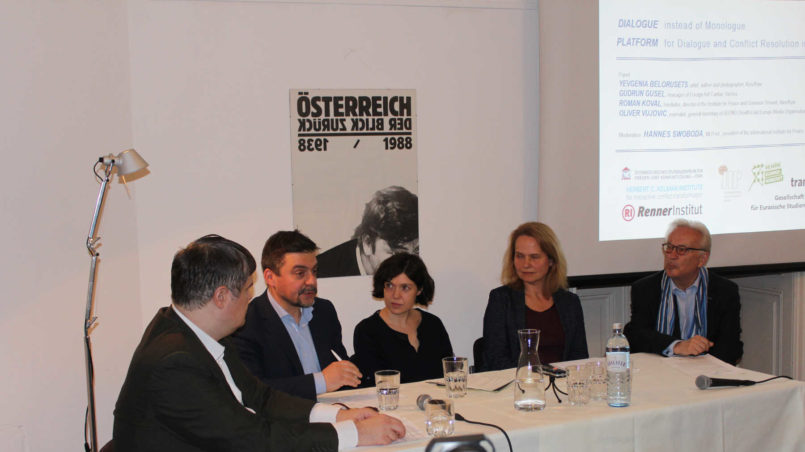
Roman Koval once again stressed the importance of maintaining the links between the places not controlled by the government and the rest of the Ukraine. His organisation is thinking about the future in which re-integration has to take place.
Yevgenia Belorusets stressed that although both Putin and Poroschenko have their problems and are “bad”, they are not “bad” to the same extent. Concerning Gudrun Gusel’s description of the situation in the rebel areas, she believes that a policy of dehumanisation in isolating and blocking this region can be recognised. This is not supported by the Ukrainian society.
Also for her as an artist, it is not possible to travel to the occupied areas; there is, however, access from the Russian side and as such, the possibility for media reporting and propoganda from the region.
This partially occurs of course; journalists allow themselves to be exploited for various political interests. In summary, according to Vujović, as a journalist one could help the dialogue but this is not a must.
Those present were given the opportunity to ask question and this possibility was taken by the 40 people who attended the event. The evening was particularly informative and interesting due to the individual views of those present from diverse perspectives on the situation in the Ukraine.

